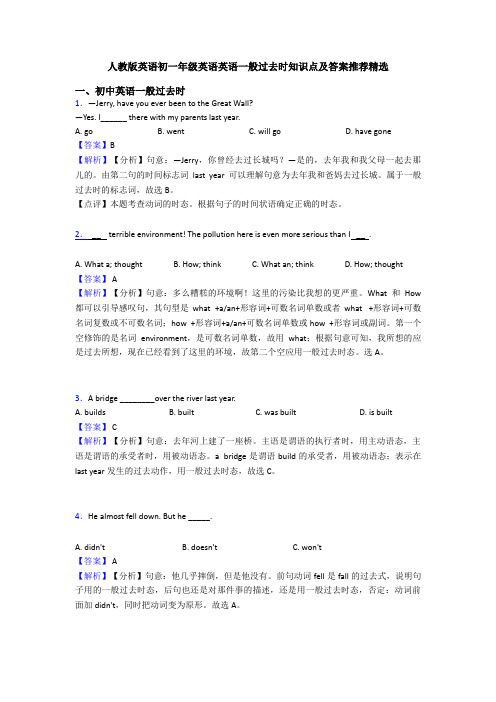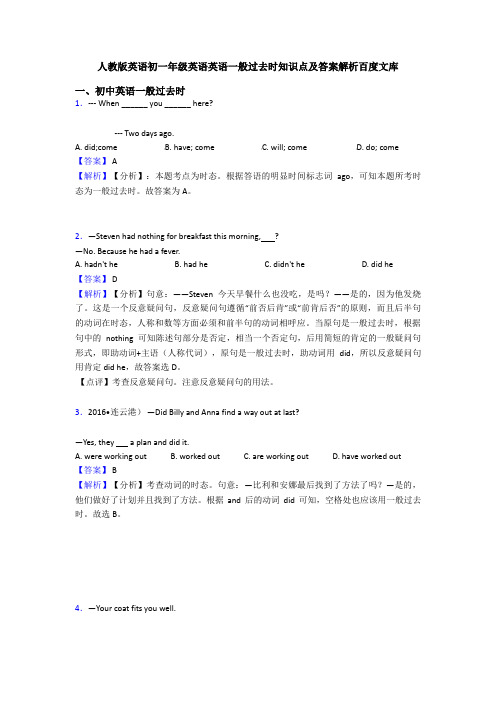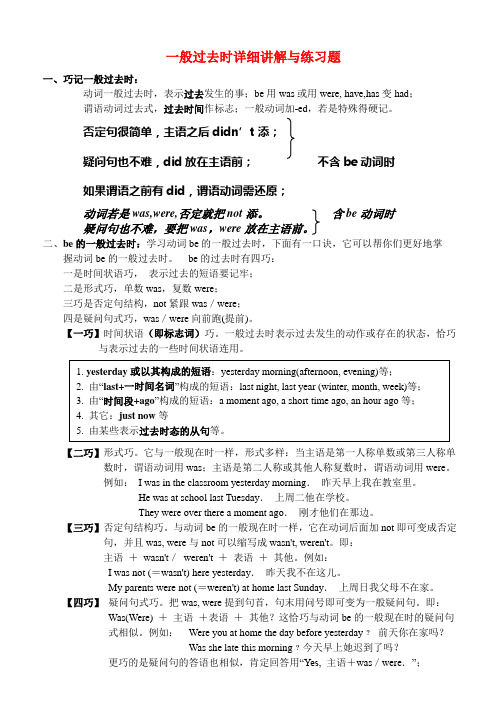「精品」初中人教版七年级英语一般过去时
英语人教版七年级下册走进“一般过去时”

走进“一般过去时”㈠【定义】:㈡【一般过去时的时间标志词】1. yesterda y 或以其构成的短语:yesterday morning (afternoon, evening)等;2. 由“last +一时间名词”构成的短语:last night, last year (winter, month, week)等;3. 由“时间段+ago ”构成的短语:a moment ago, two days ago, an hour ago 等;4. 其他:just now (刚才), this morning.㈢【一般过去时之be 动词】①be 动词的形式 (表示过去存在的状态) be 动词(is/ am/are )的过去式变化形式原形 am is are过去式 was waswere②含be 动词的句式变换规则: 肯定句 主语+was/were +其他. 例句:He/She was in Chengdu last year.否定句在was/were 后面加notHe/She wasn ’t in Chengdu last year. 一般疑问句 ----Was/were +主语+其他?--Yes , 主语+was/were ---No, 主语+wasn ’t/weren ’t ---Was he/she in Chengdu last year? --- Yes, he/she was. --- No, he/she wasn ’t. 特殊疑问句特殊疑问词+一般疑问句?Where was he/she last year?㈣【一般过去时之“行为动词”】① 规则动词的一般过去式的构成是在动词后面加ed .变化规律如下表:一般情况在动词末尾+edwalk--walked cook —cooked⊙一般过去时表示过去某个时间里发生的动作或状态;⊙过去习惯性、经常性的动作、行为;⊙过去主语所具备的能力和性格。
人教版英语初一英语英语一般过去时知识点总结及解析

人教版英语初一英语英语一般过去时知识点总结及解析一、初中英语一般过去时1.—Where did you go last winter vacation?—I ________ to London with my family.A. goB. have goneC. wentD. was going【答案】 C【解析】【分析】句意:——去年寒假你去哪里了?——我和家人去了伦敦。
A.一般现在时;B.现在完成时;C.一般过去时;D.过去进行时。
did表明时态是一般过去时,所以回答用一般过去时,故选C。
【点评】考查一般过去时,注意问句和答句时态一致,故选C。
2.He___________ his grandparents in the countryside last week.A. visitsB. visitC. visited【答案】C【解析】【分析】句意:上周,他拜访了在农村的祖父母。
A. visits 单数第三人称形式; B. visit 动词原形;C. visited一般过去式。
因为句中有一般过去式的标志性短语:last week.,故答案选C。
【点评】考查动词的时态,注意句中的时间状语。
3.He almost fell down. But he _____.A. didn'tB. doesn'tC. won't【答案】 A【解析】【分析】句意:他几乎摔倒,但是他没有。
前句动词fell是fall的过去式,说明句子用的一般过去时态,后句也还是对那件事的描述,还是用一般过去时态,否定:动词前面加didn't,同时把动词变为原形。
故选A。
4.By the time I ________ on the TV, Beckham ________ two goals.A. turned; have scoredB. turned; had scoredC. had turned; have scoredD. had turned; had scored【答案】 B【解析】【分析】句意:当我打开电视的时候,贝克汉姆已经进了两个球。
人教版英语初一年级英语英语一般过去时知识点及答案推荐精选

人教版英语初一年级英语英语一般过去时知识点及答案推荐精选一、初中英语一般过去时1.—Jerry, have you ever been to the Great Wall?—Yes. I______ there with my parents last year.A. goB. wentC. will goD. have gone【答案】B【解析】【分析】句意:—Jerry,你曾经去过长城吗?—是的,去年我和我父母一起去那儿的。
由第二句的时间标志词last year 可以理解句意为去年我和爸妈去过长城。
属于一般过去时的标志词,故选B。
【点评】本题考查动词的时态。
根据句子的时间状语确定正确的时态。
2. __ terrible environment! The pollution here is even more serious than I __ .A. What a; thoughtB. How; thinkC. What an; thinkD. How; thought 【答案】 A【解析】【分析】句意:多么糟糕的环境啊!这里的污染比我想的更严重。
What 和How 都可以引导感叹句,其句型是what +a/an+形容词+可数名词单数或者what +形容词+可数名词复数或不可数名词;how +形容词+a/an+可数名词单数或how +形容词或副词。
第一个空修饰的是名词environment,是可数名词单数,故用what;根据句意可知,我所想的应是过去所想,现在已经看到了这里的环境,故第二个空应用一般过去时态。
选A。
3.A bridge ________over the river last year.A. buildsB. builtC. was builtD. is built【答案】 C【解析】【分析】句意:去年河上建了一座桥。
主语是谓语的执行者时,用主动语态,主语是谓语的承受者时,用被动语态。
人教版英语初一年级英语英语一般过去时知识点附答案解析百度文库

人教版英语初一年级英语英语一般过去时知识点附答案解析百度文库一、初中英语一般过去时1.—Jerry, have you ever been to the Great Wall?—Yes. I______ there with my parents last year.A. goB. wentC. will goD. have gone【答案】B【解析】【分析】句意:—Jerry,你曾经去过长城吗?—是的,去年我和我父母一起去那儿的。
由第二句的时间标志词last year 可以理解句意为去年我和爸妈去过长城。
属于一般过去时的标志词,故选B。
【点评】本题考查动词的时态。
根据句子的时间状语确定正确的时态。
2.Bella, a young singer, ______ on January, 2015 because of cancer. Her death made us very sad.A. has been deadB. has diedC. was deadD. died【答案】 D【解析】【分析】句意:贝拉,一位年轻的歌手在2015年的1月因为癌症去世了。
她的死叫我们很难过。
根据时间on January, 2015可知用过去式,结合句意和语境应选D。
3.As we all know, the Silk Road _______ China to the west in ancient times.A. connectsB. connectedC. will connectD. is connecting【答案】B【解析】【分析】句意:众所周知,在古代丝绸之路是连接中国和西方的。
In ancient times“在古代”,因此要用一般过去式。
结合句意,故选B。
【点评】考查动词时态。
4.By the time I ________ on the TV, Beckham ________ two goals.A. turned; have scoredB. turned; had scoredC. had turned; have scoredD. had turned; had scored【答案】 B【解析】【分析】句意:当我打开电视的时候,贝克汉姆已经进了两个球。
人教版英语初一年级英语英语一般过去时知识点及答案解析百度文库

人教版英语初一年级英语英语一般过去时知识点及答案解析百度文库一、初中英语一般过去时1.--- When ______ you ______ here?--- Two days ago.A. did;comeB. have; comeC. will; comeD. do; come【答案】 A【解析】【分析】:本题考点为时态。
根据答语的明显时间标志词ago,可知本题所考时态为一般过去时。
故答案为A。
2.—Steven had nothing for breakfast this morning, ?—No. Because he had a fever.A. hadn't heB. had heC. didn't heD. did he【答案】 D【解析】【分析】句意:——Steven今天早餐什么也没吃,是吗?——是的,因为他发烧了。
这是一个反意疑问句,反意疑问句遵循“前否后肯”或“前肯后否”的原则,而且后半句的动词在时态,人称和数等方面必须和前半句的动词相呼应。
当原句是一般过去时,根据句中的nothing可知陈述句部分是否定,相当一个否定句,后用简短的肯定的一般疑问句形式,即助动词+主语(人称代词),原句是一般过去时,助动词用did,所以反意疑问句用肯定did he,故答案选D。
【点评】考查反意疑问句。
注意反意疑问句的用法。
3.2016•连云港)—Did Billy and Anna find a way out at last?—Yes, they a plan and did it.A. were working outB. worked outC. are working outD. have worked out【答案】 B【解析】【分析】考查动词的时态。
句意:—比利和安娜最后找到了方法了吗?—是的,他们做好了计划并且找到了方法。
根据and后的动词did可知,空格处也应该用一般过去时。
人教版英语初一年级英语英语一般过去时知识点及解析百度文库

人教版英语初一年级英语英语一般过去时知识点及解析百度文库一、初中英语一般过去时1.—The bread is really delicious.—Thank you, I ________ it myself.A. makeB. madeC. will makeD. am making【答案】B【解析】【分析】句意:—面包真的很好吃。
—谢谢,我自己做的。
根据句意“面包美味可口”得知面包已做好,则说自己做的应为过去的动作,因此应使用一般过去时态。
故答案选B。
【点评】考查动词时态的辨析。
注意根据语境判断出动作是什么时候发生的从而确定时态。
2.He almost fell down. But he _____.A. didn'tB. doesn'tC. won't【答案】 A【解析】【分析】句意:他几乎摔倒,但是他没有。
前句动词fell是fall的过去式,说明句子用的一般过去时态,后句也还是对那件事的描述,还是用一般过去时态,否定:动词前面加didn't,同时把动词变为原形。
故选A。
3.Bella, a young singer, ______ on January, 2015 because of cancer. Her death made us very sad.A. has been deadB. has diedC. was deadD. died【答案】 D【解析】【分析】句意:贝拉,一位年轻的歌手在2015年的1月因为癌症去世了。
她的死叫我们很难过。
根据时间on January, 2015可知用过去式,结合句意和语境应选D。
4.—I am sorry I _______ my exercise book at home.— Don't forget _______ it to school tomorrow.A. forget; to takeB. left; to bringC. forgot; to bringD. left; to take【答案】A【解析】【分析】forget忘记;leave留下;bring带来;take带走。
(word完整版)七年级英语一般过去时详细讲解与练习题人教版

一般过去时详细讲解与练习题一、巧记一般过去时:动词一般过去时,表示过去发生的事;be 用was 或用were, have,has 变had ;谓语动词过去式,过去时间作标志;一般动词加-ed ,若是特殊得硬记。
否定句很简单,主语之后didn ’t 添; 疑问句也不难,did 放在主语前; 不含be 动词时如果谓语之前有did ,谓语动词需还原;动词若是was,were,否定就把not 添。
含be 动词时疑问句也不难,要把was ,were 放在主语前。
二、be 的一般过去时:学习动词be 的一般过去时,下面有一口诀,它可以帮你们更好地掌 握动词be 的一般过去时。
be 的过去时有四巧:一是时间状语巧, 表示过去的短语要记牢;二是形式巧,单数was ,复数were ;三巧是否定句结构,not 紧跟was /were ;四是疑问句式巧,was /were 向前跑(提前)。
【一巧】时间状语(即标志词)巧。
一般过去时表示过去发生的动作或存在的状态,恰巧 与表示过去的一些时间状语连用。
【二巧】形式巧。
它与一般现在时一样,形式多样:当主语是第一人称单数或第三人称单 数时,谓语动词用was ;主语是第二人称或其他人称复数时,谓语动词用were 。
例如: I was in the classroom yesterday morning . 昨天早上我在教室里。
He was at school last Tuesday . 上周二他在学校。
They were over there a moment ago . 刚才他们在那边。
【三巧】否定句结构巧。
与动词be 的一般现在时一样,它在动词后面加not 即可变成否定 句,并且was, were 与not 可以缩写成wasn't, weren't 。
即:主语 + wasn't / weren't + 表语 + 其他。
例如:I was not (=wasn't) here yesterday . 昨天我不在这儿。
人教版英语七年级上英语一般过去时复习总结及答案解析百度文库

人教版英语七年级上英语一般过去时复习总结及答案解析百度文库一、初中英语一般过去时1.John and I ________ to visit his grandparents last Sunday afternoon.A. goB. wentC. will goD. have gone【答案】 B【解析】【分析】考查动词时态。
根据last Sunday知道用一般过去时,故选B。
2.Jake _____his key in the office so he had to wait until his wife _______ home.A. has forgotten … comesB. forgot… comeC. had left… cameD. had left…would come【答案】 C【解析】【分析】句意:杰克把他的钥匙丢在办公室了,因此他不得不等到他的妻子回家。
结合语境可知前文描述的是过去某时前已经完成的动作,故用过去完成时态。
下文指的是过去某时的动作,故用一般过去时态。
选C。
【点评】英语中的时态主要是借助于时间状语与上下文语境来进行判断。
解答此类题型,首先要注意句子中的时间状语,如果没有则要通过分析上下文,结合语境来判断句子的时态。
3.- The radio says there will be a heavy storm in Mount Emei tomorrow.- Bad luck. I _________ to go there with my classmates.A. planB. will planC. planned【答案】C【解析】【分析】句意:——收音机说明天峨眉山会有大暴雨。
——真倒霉。
我和我的同学计划去那里。
根据答语Bad luck可知他在听了峨眉山有大暴雨后非常失望, 可以推测他的计划被打乱了, 而这个计划肯定是早已计划好的, 是一个过去的动作, 所以此句应用一般过去时, 谓语动词应用其过去式, 结合选项故选C。
- 1、下载文档前请自行甄别文档内容的完整性,平台不提供额外的编辑、内容补充、找答案等附加服务。
- 2、"仅部分预览"的文档,不可在线预览部分如存在完整性等问题,可反馈申请退款(可完整预览的文档不适用该条件!)。
- 3、如文档侵犯您的权益,请联系客服反馈,我们会尽快为您处理(人工客服工作时间:9:00-18:30)。
一般过去时
【概念引入】
I. 何时使用一般过去时?
一般过去时表示在过去某个时间里发生的动作或存在的状态。
例如:Lin Tao left for Shanghai at 8:00 yesterday morning.
林涛昨天早上八点去上海了。
He was ill last night.
昨晚他生病了。
它可以具体分为以下几种情况:
1)表示过去经常或反复发生的动作。
例如:Li Tao always went to work by bus last term.
上学期李涛一直乘公共汽车上班。
2)表示已故的人曾经做过的事情。
例如:Lao She wrote many great works.
老舍写过许多脍炙人口的作品。
3)表示过去所发生的一系列的动作。
例如:The old man came into the room, took off his clothes and went to bed.
这位老人走进屋,脱下衣服,然后上床睡觉了。
Mr. Black got up at six o'clock this morning, dressed, had breakfast, and went to work. 布莱克先生今天早上六点起床、穿衣服、吃饭,然后去上班了。
II.如何识别一般过去时?
每个时态都会有其独特的标志性词语(主要是时间状语),我们可以称其为“标志词”。
一般过去时常见的标志词有:
1. yesterday, the day before yesterday.
2. last week / year / month / term …(简称last系列)
3. two hours ago, three years ago, a moment ago…(简称ago系列)
4. in / on + 过去的年/月/日,如in 1999, on April, 2005
5. just now, once upon a time, one day…
【用法讲解】
Ⅰ. be动词的一般过去时。
在使用一般过去时的句子中,如果句子的谓语是be动词,就要将be动词变为过去式。
主语是第一、第三人称单数,be用was;如果是第二人称或者其他人称复数,be用were。
它的一般疑问句是把was (were)提到句首;否定句是在was(were)的后面加not。
特殊疑问句是在一般疑问句的前面加特殊疑问词。
例如:My mother was busy last night. 我的妈妈昨天晚上很忙。
(肯定句)
We weren’t at school at that time. 那时我们不在学校。
(否定句)
Were you at home yesterday? 你昨天在家吗?(一般疑问句)
Where were you last night? 你昨天晚上在哪里?(特殊疑问句)
注意:there be句型中be动词的使用。
当主语是单数名词或者不可数名词时be动词用单数;当主语是名词复数时be动词用复数。
例如:There was a strong wind just now. 刚才有一阵强风。
There were many people in the supermarket last night. 昨天晚上超市有很多人。
Ⅱ. 行为动词的一般过去时。
1)基本用法。
谓语动词是行为动词的句子,在一般过去时中,要将作谓语的行为动词变成过去式。
行为动词的
过去式,一般情况下是在动词原形的后面加-ed构成,没有人称和数的变化。
例如:I wanted to have a rest just now. 我刚才想休息一下。
它的否定句要在谓语动词的前面加助动词didn’t,此时,谓语动词要变成原形。
例如:My mother watched TV last night. 我妈妈昨天晚上看电视了。
(肯定句)
My mother didn’t watch TV last night. 我妈妈昨天晚上没有看电视。
(否定句)2)行为动词的过去式的构成。
在一般过去时的句子中,行为动词过去式分为规则变化和不规则变化。
规则变化有:
(1) 一般在动词的后面加-ed。
例如:work-worked,look-looked。
(2) 以字母e结尾的动词,直接在词尾加-d。
例如:like-liked,live-lived。
(3) 以重读闭音节结尾并且词尾只有一个辅音字母的动词,先双写这个辅音字母,再加-ed。
例
如:stop-stopped。
(4) 以辅音字母+y结尾的动词,先把字母y变为i再加-ed。
例如:worry-worried。
不规则变化有:
do/does-did,go-went,write-wrote,see-saw,
begin-began,have/has-had等。
注意:在英语中不符合变化规则的词很多,要特殊记忆。
例如:They left the farm a moment ago. 他们刚刚离开农场。
He swam in the river and had a good time.
他在小河里游泳并且玩得很开心。
3)行为动词的一般疑问句。
谓语动词是实义动词,一般疑问句要借助于助动词did。
句型为:Did + 主语+ 动词原形+ 宾语?其回答仍借助于助动词,肯定回答用did,否定回答用didn’t。
例如:— Did he watch TV last night? 他昨晚看电视了吗?
—Yes, he did. / No, he didn’t. 是的,他看了。
/ 不,他没有看。
4)行为动词的特殊疑问句。
行为动词的特殊疑问句句式是:“疑问词+ did + 主语+实义动词+ 其他?”
What did you do the day before yesterday? 前天你们做什么了?
When did the Green family arrive? 格林一家什么时候到达的?
拓展:常见的特殊疑问词有:
人用who,whom;物用what;地点用where;时间用when,what time;原因用why;频率用how often;长度用how long;距离用how far等。
例如:They went there last Sunday. (对划线部分提问)
When did they go there?
The boy stayed in Beijing for two years. (对划线部分提问)
How long did the boy stay in Beijing?。
